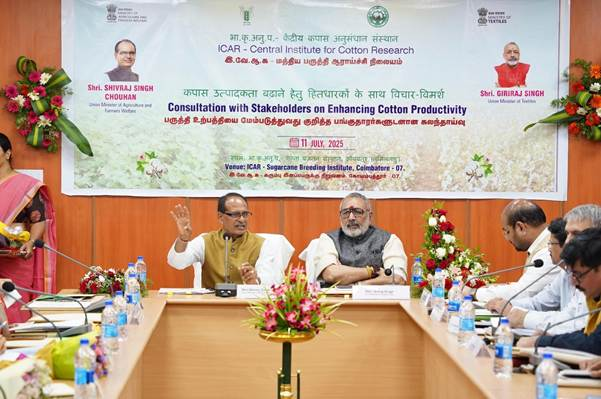Union Ministers Lead Strategic Meet in Coimbatore to Boost Cotton Productivity
The day began with Shri Shivraj Singh Chouhan visiting nearby cotton fields where he interacted directly with farmers.

- Country:
- India
In a pivotal step toward revitalising India’s cotton sector, the Union Ministry of Agriculture, Farmers’ Welfare, and Rural Development convened a high-level meeting today at the ICAR–Sugarcane Breeding Institute in Coimbatore, Tamil Nadu. Led by Union Agriculture Minister Shri Shivraj Singh Chouhan, the meeting focused on the national imperative to enhance cotton productivity, improve seed quality, and address sector-wide challenges affecting farmers and the textile industry alike.
The meeting, held under the aegis of the Centre’s Viksit Krishi Sankalp Abhiyan, marks a continuation of crop-specific consultations initiated by Shri Chouhan earlier this year, following a major soybean-centric dialogue in Indore, Madhya Pradesh. The event in Coimbatore saw attendance from top stakeholders across India’s cotton value chain, including Union Minister of Textiles Shri Giriraj Singh, Agriculture Ministers from Haryana and Maharashtra, Vice Chancellors of state agricultural universities, ICAR Director General Dr. M.L. Jat, cotton scientists, farmer leaders, and field-level practitioners.
Listening to Farmers: On-Ground Realities Shape Policy Directions
The day began with Shri Shivraj Singh Chouhan visiting nearby cotton fields where he interacted directly with farmers. He listened to their concerns regarding declining yields, pest infestations, input costs, and seed quality. These grassroots-level insights set the tone for a pragmatic and inclusive dialogue during the main session at the institute.
In his keynote address, Shri Chouhan underscored the historical and cultural significance of Tamil Nadu, calling it “the sacred land where a new cotton revolution is taking root.” He stressed that cotton is not merely a commercial crop but a foundational pillar of human necessity, second only to food. “Without cotton, there is no clothing. Without farmers, there is no cotton. And without agriculture, India cannot move forward,” he declared.
The Cotton Conundrum: High Potential, Lagging Yields
India is the world’s largest cotton producer by area, but its productivity per hectare remains below global averages, a concern voiced by all present. Shri Chouhan highlighted how Bt cotton, once hailed for its ability to raise yields, is now losing effectiveness due to disease and pest resistance, especially from pink bollworms and whiteflies. This vulnerability is contributing to a decline in overall productivity and has increased dependency on inputs, driving up cultivation costs.
“India must not lag behind when it comes to technology,” he said. “Other countries are making great strides in developing virus-resistant, high-yielding seed varieties. We must also act decisively and urgently.” He tasked Indian agricultural research institutions and seed corporations with accelerating the development of robust cotton varieties and ensuring timely seed distribution to farmers.
Bridging the Gap Between Farmers and the Textile Industry
A key issue raised during the meeting was the need to balance the interests of cotton farmers and the textile industry. Farmers demand higher Minimum Support Prices (MSP) and import restrictions to protect domestic prices, while textile industry leaders often call for lower import duties to access cheaper foreign cotton.
Acknowledging these divergent views, Shri Chouhan said, “We must find a path that respects both perspectives. The prosperity of farmers and the competitiveness of our textile sector must go hand-in-hand. It’s a tightrope walk, but one we must undertake with wisdom.”
Shri Giriraj Singh, Minister of Textiles, reiterated his ministry’s commitment to enhancing domestic cotton quality for use in premium fabrics and export markets. He stressed that raw material consistency is critical to meet global standards, urging collaborative research efforts between agriculture and textile sectors.
A Multi-Tiered Approach to Cotton Revitalisation
The conference outlined a three-pronged roadmap for cotton development:
-
Research and Innovation:
-
Development of pest-resistant and climate-resilient cotton varieties.
-
Seed technology advancements to counter Bt fatigue.
-
Strengthening of agricultural extension services for better farmer reach.
-
-
Infrastructure and Market Linkages:
-
Expansion of fibre testing labs and cotton storage facilities.
-
Digitally integrated procurement systems through e-NAM and FPO networks.
-
Price stabilization mechanisms through Cotton Corporation of India (CCI).
-
-
Policy and Institutional Support:
-
Review of MSP based on dynamic cost structures.
-
Timely release of subsidies and crop insurance claims.
-
Incentivisation of cotton intercropping to boost land use efficiency.
-
The Vice Chancellors of agriculture universities from Gujarat, Telangana, Maharashtra, and Punjab presented regional cotton research updates. Case studies from Tamil Nadu and Maharashtra highlighted successful farmer-led innovations in cotton cultivation, including the adoption of biofertilizers, drip irrigation, and integrated pest management.
“Viksit Bharat” Through “Viksit Krishi”
Shri Chouhan concluded by tying cotton development to the larger national vision of ‘Viksit Bharat’ (Developed India). “Our goal is self-reliance in cotton. We must not depend on imports. High-quality, homegrown cotton is not just a target — it is a duty to our farmers, our economy, and our pride,” he said. He pledged full central government support for state-specific cotton missions aligned with national objectives.
The Agriculture Minister called on scientists and administrators to adopt a results-oriented mindset, warning that symbolic meetings without action would not suffice. He urged all stakeholders to commit to crop-wise transformation strategies that directly benefit farmers and strengthen India’s food and fibre sovereignty.
Looking Ahead
The Coimbatore meeting sets the stage for a nationwide cotton revitalisation campaign, with Tamil Nadu poised to lead as a model state. The coming months will see the announcement of a comprehensive Cotton Development Plan under the Ministry of Agriculture, integrating research, extension, infrastructure, and industry linkages.
India’s cotton future, though presently under strain, holds immense potential. As global textile markets evolve and climate challenges mount, India’s ability to adapt and innovate at the farm level will determine whether it remains a cotton powerhouse or becomes reliant on imports.










